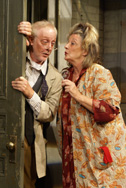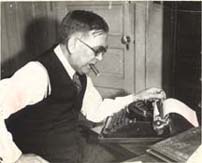“For me, it is as though at every moment the actual world had completely lost its actuality. As though there was nothing there; as though there were no foundations for anything or as though it escaped us. Only one thing, however, is vividly present: the constant tearing of the veil of appearances; the constant destruction of everything in construction. Nothing holds together, everything falls apart.”
Eugène Ionesco, Notes and Counter-Notes
Archives for January 2009
TT: Between life and art
I was checking my e-mail yesterday afternoon when I got this message from a friend of mine who had just returned to his home in North Carolina from a visit to New York:
Just back. Thank God I wasn’t going to Charlotte. That plane left
just a little over an hour after ours.
“What plane?” I said out loud, and immediately went surfing for news. I didn’t have to go far to find out about the bird strike that brought down a commercial airliner that had just taken off from LaGuardia, the airport from which I depart once or twice a month.
Being a drama critic, the next thing I thought of was Charlie Victor Romeo, the extraordinary documentary play whose script is drawn from black-box recordings:
I reviewed Charlie Victor Romeo (in which a bird strike figures prominently) five years ago in The Wall Street Journal. What I wrote then seems worth reprinting now as we read of how the captain and crew of US Airways 1549 saved the lives of 155 men, women, and children. The word hero gets tossed about too casually nowadays, but sometimes it’s exactly right.
* * *
Forget reality TV. If you want to watch raw slices of real life–and death–transformed into the highest possible drama, go see “Charlie Victor Romeo,” a performance piece based on transcripts of the black-box recordings of six airplane crashes. (The title is military alphabetic code for “Cockpit Voice Recorder.”) “Charlie Victor Romeo” holds you in a hammerlock for 90 unforgettable minutes. It’s the most frightening show I’ve ever seen….
“Charlie Victor Romeo” was created by Bob Berger, Patrick Daniels and Irving Gregory of Collective: Unconscious, a Manhattan-based experimental theater group. It’s a low-budget, unabashedly unglamorous affair. You stroll into a grubby black-box theater (talk about ironic!) in which a nondescript mock cockpit is placed at center stage. The house goes dark and a slide flashes on a screen overhead, telling you the flight number and date and how many people were on board, followed by a stark description of what went wrong: ICING. EXPLODING ENGINE. MULTIPLE BIRD STRIKES. Then the lights come up and all hell breaks loose.
Not always at once, though. Instead, you might find a pilot and co-pilot chatting away agreeably, flirting with a flight attendant, griping about this or that minor nuisance. But sooner or later–always without warning–something terrible happens, and in an instant the theater becomes a sweatbox. You watch in horror as the crew scrambles to save the ship while alarms beep and buzz, the radio crackles urgently and passengers scream on the far side of the cockpit door. Sometimes the crisis is protracted, sometimes shockingly brief (one flight lasts for just a minute and a half). Then the theater is filled with the clamor of a crash landing, abruptly cut off by a sharp click as the house goes black. After a seemingly endless pause, the slide shown at the beginning of the flight is flashed on the screen again, this time with an additional line at the bottom: NO SURVIVORS. NO SURVIVORS. 4 SURVIVORS. NO SURVIVORS.
If any of this sounds gimmicky–or, worse yet, exploitative–be assured that “Charlie Victor Romeo” is deadly serious from takeoff to landing. The transcripts have not been altered in any way. We learn nothing personal about the men and women who are fighting for their lives, not even their names. All we see is what happens when they are plunged into chaos. Once or twice they panic. (In one hair-raising sequence, the pilot and co-pilot quarrel furiously over what to do next.) More often, though, they conduct themselves coolly, even heroically. And though the clipped dialogue is as unpretentious as a conversation overheard on a crosstown bus, it’s full of lines that stick in your head like bloody thorns: “I’ll tell you, flying at night, I don’t like it worth a —-.” “We have no basic instruments, no altimeter, no airspeed indicator. We declare an emergency!” “I really have my doubts you’ll see us standing up, honey.” “Whatever you do, keep us away from the city.” Click.
Mr. Gregory’s cut-to-the-crash direction and the unselfconscious performances of the eight-person cast are as good as they could possibly be. Likewise the thunderous, enveloping sound effects created by Jamie Mereness, which are central to the overwhelming impact of “Charlie Victor Romeo.” I can’t think of a better tribute to its plain-spoken realism than the fact that an earlier production was filmed by the U.S. Air Force and is now being used as a training video. One of the pilots portrayed on stage, it seems, actually attended a performance–and was impressed.
I have a special perspective on “Charlie Victor Romeo”: I became afraid of flying a few years ago, and went into psychotherapy in order to cope with the problem. Not surprisingly, I found the first part of the show so alarming that I wanted to hide under my seat. But as I watched each flight unfold, I found myself drawn ever more deeply into the drama of brave men and women doing their best to buck the odds. Sometimes they did, more often not. Yet at evening’s end I felt oddly reassured by the knowledge of how hard they had tried. So will you.
TT: So you want to see a show?
Here’s my list of recommended Broadway, off-Broadway, and out-of-town shows, updated weekly. In all cases, I gave these shows favorable reviews (if sometimes qualifiedly so) in The Wall Street Journal when they opened. For more information, click on the title.
Warning: Broadway shows marked with an asterisk were sold out, or nearly so, last week.
BROADWAY:
• August: Osage County (drama, R, adult subject matter, reviewed here)
• Avenue Q * (musical, R, adult subject matter and one show-stopping scene of puppet-on-puppet sex, reviewed here)
• The Little Mermaid * (musical, G, entirely suitable for children, reviewed here)
• South Pacific * (musical, G/PG-13, some sexual content, brilliantly staged but unsuitable for viewers acutely allergic to preachiness, reviewed here)
OFF BROADWAY:
• The Cripple of Inishmaan (black comedy, PG-13, closes Mar. 1, reviewed here)
• The Fantasticks (musical, G, suitable for children capable of enjoying a love story, reviewed here)
IN CHICAGO:
• The Seafarer (drama, PG-13, closes Feb. 22, reviewed here)
REOPENING NEXT WEEK ON BROADWAY:
• Alfred Hitchcock’s The 39 Steps (comedy, G, suitable for bright children, reopens Jan. 21, reviewed here)
REOPENING NEXT WEEK OFF BROADWAY:
• Enter Laughing (musical, PG-13, reopens Jan. 21, closes Mar. 8, reviewed here)
CLOSING SOON IN WEST PALM BEACH, FLA.:
 • The Chairs (surrealist comedy, PG-13, far too complicated for children, closes Feb. 1, reviewed here)
• The Chairs (surrealist comedy, PG-13, far too complicated for children, closes Feb. 1, reviewed here)
CLOSING SOON ON BROADWAY:
• Equus (drama, R, nudity and adult subject matter, closes Feb. 8, reviewed here)
CLOSING NEXT WEEK IN CORAL GABLES, FLA.:
• Adding Machine (serious musical, PG-13, closes Jan. 25, reviewed here)
TT: Almanac
“There is no religion in which everyday life is not considered a prison; there is no philosophy or ideology that does not think that we live in alienation.”
Eugène Ionesco, Present Past Past Present
TT: Snark and its discontents
 Apropos of the current debate over snark, a neader writes:
Apropos of the current debate over snark, a neader writes:
I read your book on H.L. Mencken, a personal hero of mine. It was a very good biography. I just wondered whether you ever wanted to cut loose and be a real asshole while you were writing the book, like H.L. Mencken, since nobody writes like that anymore, and frankly, who can stand human beings and their phony sensible perspective? Your tone was pretty academic, despite the subject matter….The Internet has unleashed a lot of juvenility and hatred but very little that is quite so focused and “intellectual” and satirical as Mencken’s style. Our mainstream norms nowadays seem to prevent that kind of expression, like you didn’t say “trousers” in the presence of a lady in Victorian England. I like vicious expressions of highfalutin sentiments.
Oddly enough, I received this e-mail on the same day that I was quoted in Florida Weekly as follows:
I just don’t like snarkiness. It’s a cultural trend, I think, driven by the Web, where snarkiness is considered a virtue. It’s legitimate to be funny in a review, but there’s a certain kind of nastiness that I don’t like. Sneering about the serious efforts of a serious artist is not, in my opinion, an appropriate way to respond to things.
This being the case, why did I write a biography of Mencken in the first place? Because Mencken, as my correspondent clearly implies, wasn’t snarky: he was a serious man with a satirical turn of mind. Unlike the drive-by snarkmeisters of the Web, he carried more than enough intellectual guns to justify his bruising sarcasm. The reason why I didn’t write about Mencken à la Mencken, on the other hand, is because I don’t think that kind of rough stuff holds up very well at book length (not to mention the regrettable fact that I’m not as good a writer as H.L. Mencken). I, too, like “vicious expressions of highfalutin sentiments,” but a five-hundred-page biography is an altogether different proposition, one that calls for a cool head and a fair amount of detachment. Sarcasm is for short hitters.
As for snark, I’m against it–mostly. But sometimes not. As Noël Coward said in Private Lives, “You mustn’t be serious, my dear one, it’s just what they want….All the futile moralists who try to make life unbearable. Laugh at them. Be flippant. Laugh at everything, all their sacred shibboleths. Flippancy brings out the acid in their damned sweetness and light.” It also cuts through the grease of smugness, which of late has become endemic to the American cultural conversation. In the ever-relevant words of Justice Holmes, “I detest a man who knows that he knows.” The thumbed nose is the only appropriate response to such odious self-satisfaction.
TT: Snapshot
Doc Watson performs “Deep River Blues”:
(This is the latest in a weekly series of arts-related videos that appear in this space each Wednesday.)
TT: Almanac
“Blues is easy to play, but hard to feel.”
Jimi Hendrix (quoted in Charles Shaar Murray, Crosstown Traffic)
TT: Coast to coast to coast (II)
 JANUARY 7 The Biltmore Hotel in Coral Gables, built in 1925 and restored in 1987, is a preposterous but wonderful heap of stucco and concrete, the kind of place that’s catnip to the moderately monied classes (i.e., those who can’t afford to buy a villa in Palm Beach). The first car that Mrs. T and I saw when we pulled into the driveway was a chauffeured Rolls-Royce. The restaurant in which we took most of our meals was located in a Moorish-style courtyard. The swimming pool is roughly the size of New Hampshire, and it’s not unheard-of for guests to smoke torpedo-sized cigars while sitting in their lounge chairs.
JANUARY 7 The Biltmore Hotel in Coral Gables, built in 1925 and restored in 1987, is a preposterous but wonderful heap of stucco and concrete, the kind of place that’s catnip to the moderately monied classes (i.e., those who can’t afford to buy a villa in Palm Beach). The first car that Mrs. T and I saw when we pulled into the driveway was a chauffeured Rolls-Royce. The restaurant in which we took most of our meals was located in a Moorish-style courtyard. The swimming pool is roughly the size of New Hampshire, and it’s not unheard-of for guests to smoke torpedo-sized cigars while sitting in their lounge chairs.
Not being anything remotely approaching a moderately monied person, I’ve spent next to none of my life to date in resort hotels, much less in communities whose climate permits swimming in January. Needless to say, I wouldn’t have been staying in this one were it not for the unlikely fact that GableStage, the Coral Gables drama company whose production of Adding Machine was one of the shows I came to Florida to review for The Wall Street Journal, is headquartered on the grounds of the hotel. At first I felt out of place, but after spending a balmy afternoon sipping cool drinks at poolside, I started to see the point of Florida. Or maybe not: I chose Flannery O’Connor’s The Violent Bear It Away as my poolside book, and spent one morning holed up in my room writing my drama column for last Friday’s Journal. Man cannot live by pleasure alone!
JANUARY 8 Mrs. T and I checked out of the Biltmore at noon, then satisfied a long-standing wish by driving to Miami Beach and lunching at Joe’s Stone Crab, a restaurant about which Ian Fleming wrote (he called it “Bill’s on the Beach,” but everybody knew it was Joe’s) in Goldfinger:
Bond followed suit and proceeded to eat, or rather devour, the most delicious meal he had had in his life.
The meat of the stone crabs was the tenderest, sweetest shellfish he had ever tasted….
With a slight belch, Mr. Du Pont for the last time wiped butter off his chin with his silken bib and sat back. His face was flushed. He looked proudly at Bond. He said reverently, “Mr. Bond, I doubt if anywhere in the world a man has eaten as good a dinner as that tonight.”
That was in 1959, but the crabs at Joe’s are still pretty damn good.
 Our next stop was the Coral Springs Museum of Art, where we strolled through an exhibition of paintings and works on paper by Milton Avery that come from the collection of Louis and Annette Kaufman, who in 1926 bought the first painting that Avery ever sold. (They paid $25 for it.) I’ve written about Louis, the great Hollywood violinist, in this space and elsewhere, and last February Mrs. T and I had the privilege of spending a day with Annette, his widow, in Los Angeles, where some of the paintings now on display in Coral Springs were hanging in her Lloyd Wright-designed home. At ninety-four she remains alarmingly active, and has promised to come see The Letter in Santa Fe this summer. I wouldn’t doubt it!
Our next stop was the Coral Springs Museum of Art, where we strolled through an exhibition of paintings and works on paper by Milton Avery that come from the collection of Louis and Annette Kaufman, who in 1926 bought the first painting that Avery ever sold. (They paid $25 for it.) I’ve written about Louis, the great Hollywood violinist, in this space and elsewhere, and last February Mrs. T and I had the privilege of spending a day with Annette, his widow, in Los Angeles, where some of the paintings now on display in Coral Springs were hanging in her Lloyd Wright-designed home. At ninety-four she remains alarmingly active, and has promised to come see The Letter in Santa Fe this summer. I wouldn’t doubt it!
At length we made our way across the Everglades (which look like Kansas with palm trees) to Fort Myers, where my presence was treated as news by a local weekly. I’m still trying to figure that out.
Here’s the money quote:
What I am trying to do in my drama column is let the readers of The Wall Street Journal know that you don’t have to go to New York to see destination theater, that you can find it where you live, or near where you live, or in cities that it wouldn’t occur to you to go to, to make a theater trip. Like Chicago. In my opinion, people ought to go to Chicago to see theater in exactly the same way that they go to New York to see theater. Or Los Angeles. Or Washington D.C., a major theater center. I’ve taken it as a personal cause to try to spread the word about regional theater…no matter where you are, there is theater of the highest possible quality that you would want to see.
Like all good things, our resort-hotel days had come to an end, and we checked into in a Holiday Inn just outside of the downtown historic district, not far from the theater where Florida Rep was about to open a new production of Brian Friel’s Dancing at Lughnasa, a masterpiece by the man whom I believe to be the greatest living English-speaking playwright. Holiday Inns and comfy B&Bs are more our speed, though it was fun to play rich for a few days.
(To be continued)
